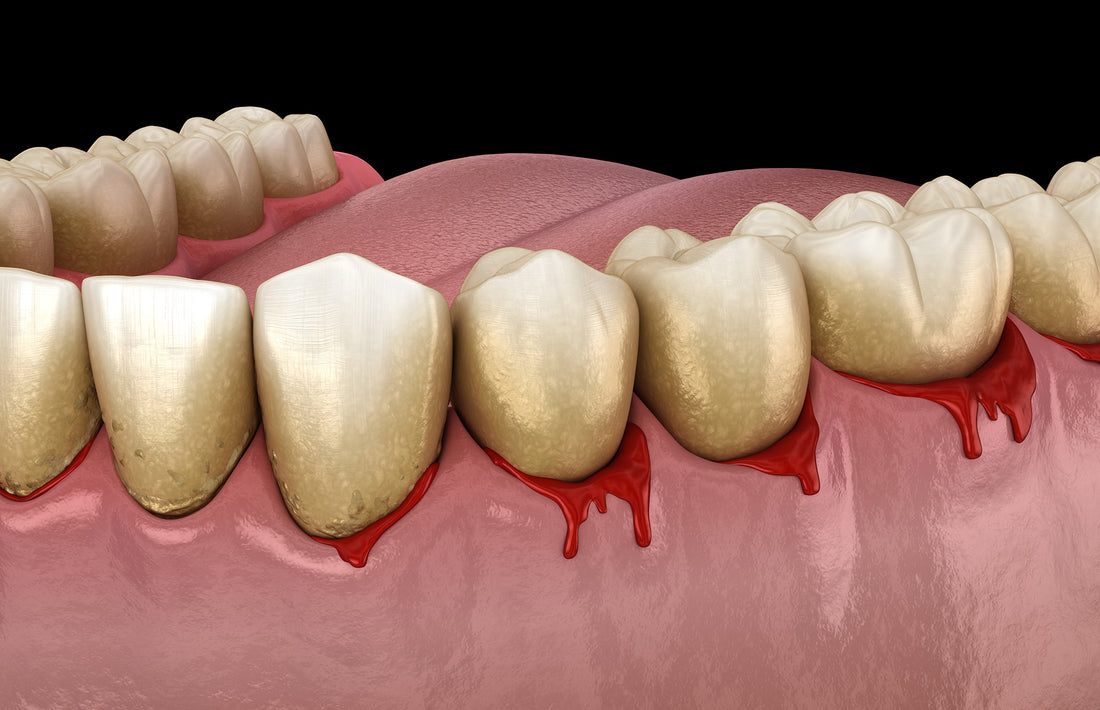
Why Are My Gums Bleeding and How Can I Stop It?
We’ve all been there – standing in front of the mirror, toothbrush in hand, only to find blood mingling with toothpaste as we brush or floss our teeth. Well, 47.2% of people aged 30 and above have experienced this unsettling sight. If you notice that your gums are bleeding, they could mean something more significant about your oral health, and you don’t want to overlook it.
Why Your Gums Are Bleeding
1. Gingivitis
If you hear a dentist mention the early stage of gum disease, they are talking about gingivitis. Gingivitis is a disease that causes your gum to become inflamed and bleed. It occurs when people fail to adequately remove food that ends up accumulating on the gum line and causes it to appear swollen, red, and tender.
The good news is that gingivitis is reversible with proper oral hygiene and professional dental care. If diagnosed early, you can treat it, and the gums can return to a healthy state. However, if left untreated, gingivitis can progress to a more severe gum disease called periodontitis, which causes irreversible gum damage and may lead to tooth loss.
2. Periodontal Disease
As mentioned earlier, periodontal disease occurs when gingivitis is left untreated. Technically, periodontal disease is already a setback to your oral health. But, if left longer, the gum inflammation may spread deeper into the supporting structures of the teeth, including the bone. This can lead to pockets forming between the teeth and gums, which can trap bacteria and debris. The presence of these pockets and the ongoing infection can cause the gums to become even more inflamed, and you may notice your gums are bleeding frequently.
3. Using Hard bristles and Brushing Too Hard
Brushing too hard means you are applying excessive pressure on your gum line. Now, imagine using toothbrushes with bristles that are too stiff. Gums are sensitive and can easily get injured if not treated gently. The combination of vigorous hand movement and tough bristles can irritate and damage your delicate gum tissue, causing them to become inflamed, swell and bleed.
4. Flossing Incorrectly
Like brushing, poor flossing techniques can also cause your gum to bleed. Most people snap the floss down onto the gums instead of gently sliding it between the teeth. Flossing this way will cause your flossing string to hit the gums abruptly and make them sore.
On the other hand, you may floss too far down between the teeth and into the gum pocket, which traumatizes the gums and cause bleeding. Moving the floss back and forth harshly can irritate the gums and lead to bleeding. The easiest way to avoid gum bleeding while flossing is to use a water flosser.
5. Medical-Related Conditions
People with medical conditions like blood disorders (Hemophilia, von Willebrand Disease), leukemia, vitamin deficiencies, diabetes, HIV/AIDS, and liver disease may also notice that their gums are bleeding frequently. Hemophilia and von Willebrand disease are genetic disorders that impair the blood's ability to clot properly. So, when your gum gets bruised, it won’t have the ability to heal fast. The same also occurs with Leukemia, liver disease, and vitamin deficiencies.
On the flip side, diabetics weaken the blood vessels and affect blood circulation, which slows the body's ability to heal and fight infections. People with advanced HIV/AIDS will also find it difficult to maintain their immune systems, making them more susceptible to infections, including gingivitis, which causes gum bleeding.
6. Medications
Certain medications also increase the risk of gum bleeding. For instance, if you use anticoagulants (blood thinners), antiplatelet drugs like Aspirin, or take Non-Steroidal Anti-Inflammatory Drugs (NSAIDs) frequently, they can increase the risk of bleeding by affecting the blood's ability to clot properly. Most chemotherapy drugs can also affect the body's ability to produce blood cells, which can cause your gum to bleed.
7. Smoking
A study published by the Centers for Disease Control and Prevention suggests that smokers are 2 times more prone to gum diseases like gingivitis and periodontal disease than non-smokers. Smoking restricts blood flow to the gums, which impairs the body's ability to deliver oxygen and nutrients to the gum tissues. The result is that it weakens the gums' ability to fight off infections that may affect the teeth and gum. So, if you smoke, you may experience gum bleeding frequently.
Bleeding Gum Remedies to Ensure Good Oral Health
To promote healthy gum and ensure overall teeth and oral health, the first step to consider is improving your oral hygiene habits. Brush your teeth at least twice daily using gentle motions, a soft-bristle toothbrush, and fluoride toothpaste. Other bleeding gum remedies to consider for good oral health include:
- Floss daily to remove food particles and plaque between your teeth and along the gumline.
- Use an antiseptic mouthwash to reduce bacteria and promote gum health.
- Be gentle when flossing, and avoid snapping the floss against your gums.
- Rinse your mouth with a warm saltwater solution (1/2 teaspoon of salt in an 8-ounce glass of warm water) after brushing and flossing. It helps soothe your gums and promote healing.
- Eat fruits, vegetables, whole grains, lean proteins, and low-fat dairy products that provide essential nutrients your gum needs to stay healthy.
- Quit smoking
- If you have underlying medical conditions that affect your gum health, work with your healthcare provider to manage them effectively.
Oral habits like this can significantly reduce gum bleeding faster than you think. Still, to be on the safe side, schedule regular visits with your dentists to monitor your gum health and provide early intervention if needed.
